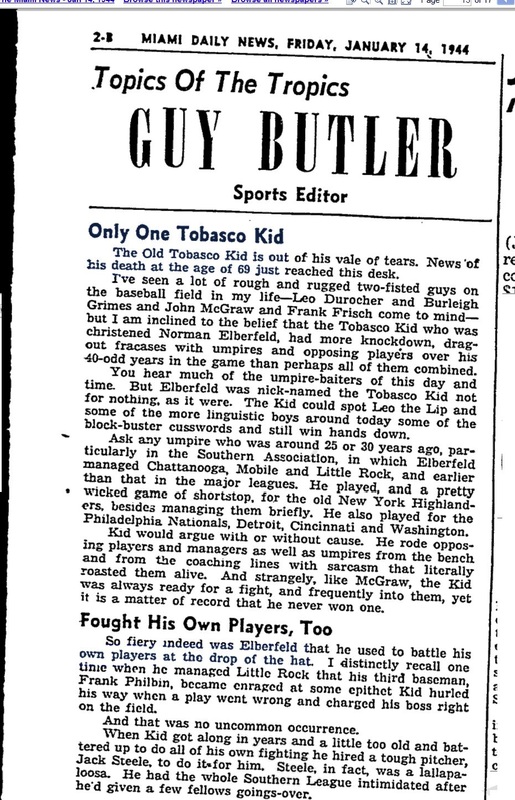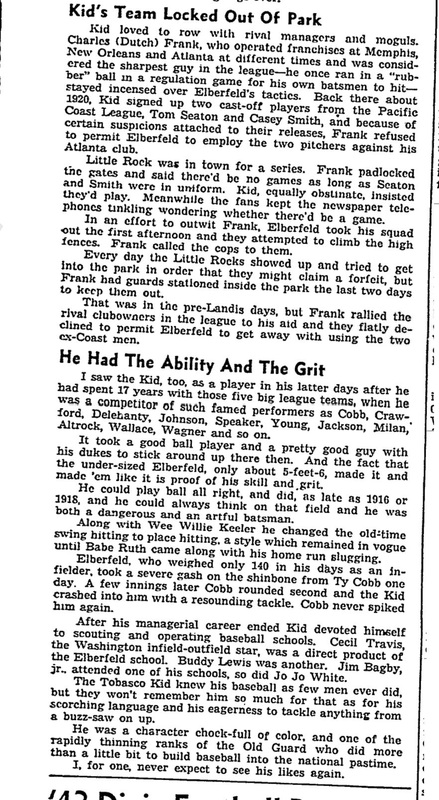Kid Elberfeld - January 14, 1944 - Miami Daily News, Florida - Obituary
MIAMI DAILY NEWS, FRIDAY, JANUARY 14, 1944
Topics Of The Tropics GUY BUTLER, Sports Editor
'''Only One Tobasco Kid'''
The Old Tobasco Kid is out of his vale of tears. News of Lis death at the age of 69 just. reached this desk. I've seen a lot of rough and rugged two-fisted guys on the baseball field in my life—Leo Duroeher and Burleigh Grimes and John McGraw and Frank Frisch come to mind— but I am inclined to the belief that the Tobasco Kid who was christened Norman Elberfeld, had more knockdown, drag- out fracases with umpires and opposing players over his 40-odd years in the game than perhaps all of them combined. You hear much of the umpire-baiters of this day and time. But Elberfeld was nick-named the Tobasco Kid not for nothing, as it were.
The Kid could spot Leo the Lip and some of the more linguistic boys around today some of the block-buster cusswords and still win hands down. Ask any umpire who was around 25 or 30 years ago, particularly in the Southern Association, in which Elberfeld managed Chattanooga, Mobile and Little Rock, and earlier than that in the major leagues. He played, and a pretty wicked game of shortstop, for the old New York Highlanders. besides managing them briefly. He also played for the Philadelphia Nationals, Detroit, Cincinnati and Washington. Kid would argue with or without cause. He rode opposing players and managers as well as umpires from the bench and from the coaching lines with sarcasm that literally roasted them alive. And strangely, like McGraw, the Kid was always ready for a fight, and frequently into them, yet it is a matter of record that he never won one.
'''Fought His Own Players, Too'''
So fiery indeed was Elberfeld that he used to battle hisown players at the drop of the hat.. I distinctly recall one time when he managed Little Rock that his third baseman, Frank Philbin, became enraged at some epithet Kid hurled his way when a play went wrong and charged his boss right on the field. And that was no uncommon occurrence. When Kid got along in years and a little too old and battered up to do all of his own fighting he hired a tough pitcher, Jack Steele. to do Astor him. Steele, in fact, was a lallapaloosa. He had the whole Southern League intimidated after he'd given a few fellows goings-over. '
''Kid's Team Locked Out Of Park'''
Kid loved to row with rival managers and moguls. Charles (Dutch) Frank, who operated franchises at Memphis, New Orleans and Atlanta at different times and was considered the sharpest guy in the league—he once ran in a "rubber" ball in a regulation game for his own batsmen to hit— stayed incensed over Elberfeld's tactics. Back there about 1920, Kid signed up two cast-off players from the Pacific Coast League, Toni Seaton and Casey Smith, and because of certain suspicions attached to their releases, Frank refused to permit Elberfeld to employ the two pitchers against his Atlanta club. Little Rock was in town for a series. Frank padlocked the gates and said there'd be no games as long as Seaton and Smith were in uniform. Kid, equally obstinate, insisted they'd play. Meanwhile the fans kept the newspaper telephones tinkling wondering whether there'd be a game. In an effort to outwit Frank, Elberfeld took his squad out the first afternoon and they attempted to climb the high fences. Frank called the cops to them. Every day the Little Rocks showed up and tried to get into the park in order that they might claim a forfeit, but Frank had guards stationed inside the park the last two days to keep them out. That was in the pre-Landis days, but Frank rallied the rival clubowners in the league to his aid and they flatly declined to permit Elberfeld to get away with using the two ex-Coast men. '
''He Had The Ability And The Grit'''
I saw the Kid, too, as a player in his latter days after he had spent 17 years with those five big league teams, when he was a competitor of such famed performers as Cobb, Crawford, Delehanty, Johnson, Speaker, Young, Jackson, Milan,' Altrock, Wallace, Wagner and so on. It took a good ball player and a pretty good guy with his dukes to stick around up there then. And the fact that the under-sized Elberfeld, only about 5-feet-6, made it and made 'ern like it is proof of his skill and grit. He could play ball all right, and did, as late as 1916 or 1918, and he could always think on that field and he was both a dangerous and an artful batsman. Along with Wee Willie Keeler he changed the old-time swing hitting to place hitting, a style which remained in vogue until Babe Ruth came along with his home run slugging. Elberfeld, who weighed only 140 in his days as an infielder, took a severe gash on the shinbone from Ty Cobb one day. A few innings later Cobb rounded second and the Kid crashed into him with a resounding tackle. Cobb never spiked him again. After his managerial career ended Kid devoted himself to scouting and operating baseball schools. Cecil Travis, the Washington infield-outfield star, was a direct product of the Elberfeld school. Buddy Lewis was another. Jim Bagby, Jr.. attended one of his schools, so did Jo Jo White. The Tobasco Kid knew his baseball as few men ever did, but they won't remember him so much for that as for his scorching language and his eagerness to tackle anything from a buzz-saw on up. He was a character chock-full of color, and one of the rapidly thinning ranks of the Old Guard who did more than a little bit to build baseball into the national pastime. I, for one, never expect to see his likes again.
:January 14, 1944 - Miami Daily News, Florida - Obituary
Topics Of The Tropics GUY BUTLER, Sports Editor
'''Only One Tobasco Kid'''
The Old Tobasco Kid is out of his vale of tears. News of Lis death at the age of 69 just. reached this desk. I've seen a lot of rough and rugged two-fisted guys on the baseball field in my life—Leo Duroeher and Burleigh Grimes and John McGraw and Frank Frisch come to mind— but I am inclined to the belief that the Tobasco Kid who was christened Norman Elberfeld, had more knockdown, drag- out fracases with umpires and opposing players over his 40-odd years in the game than perhaps all of them combined. You hear much of the umpire-baiters of this day and time. But Elberfeld was nick-named the Tobasco Kid not for nothing, as it were.
The Kid could spot Leo the Lip and some of the more linguistic boys around today some of the block-buster cusswords and still win hands down. Ask any umpire who was around 25 or 30 years ago, particularly in the Southern Association, in which Elberfeld managed Chattanooga, Mobile and Little Rock, and earlier than that in the major leagues. He played, and a pretty wicked game of shortstop, for the old New York Highlanders. besides managing them briefly. He also played for the Philadelphia Nationals, Detroit, Cincinnati and Washington. Kid would argue with or without cause. He rode opposing players and managers as well as umpires from the bench and from the coaching lines with sarcasm that literally roasted them alive. And strangely, like McGraw, the Kid was always ready for a fight, and frequently into them, yet it is a matter of record that he never won one.
'''Fought His Own Players, Too'''
So fiery indeed was Elberfeld that he used to battle hisown players at the drop of the hat.. I distinctly recall one time when he managed Little Rock that his third baseman, Frank Philbin, became enraged at some epithet Kid hurled his way when a play went wrong and charged his boss right on the field. And that was no uncommon occurrence. When Kid got along in years and a little too old and battered up to do all of his own fighting he hired a tough pitcher, Jack Steele. to do Astor him. Steele, in fact, was a lallapaloosa. He had the whole Southern League intimidated after he'd given a few fellows goings-over. '
''Kid's Team Locked Out Of Park'''
Kid loved to row with rival managers and moguls. Charles (Dutch) Frank, who operated franchises at Memphis, New Orleans and Atlanta at different times and was considered the sharpest guy in the league—he once ran in a "rubber" ball in a regulation game for his own batsmen to hit— stayed incensed over Elberfeld's tactics. Back there about 1920, Kid signed up two cast-off players from the Pacific Coast League, Toni Seaton and Casey Smith, and because of certain suspicions attached to their releases, Frank refused to permit Elberfeld to employ the two pitchers against his Atlanta club. Little Rock was in town for a series. Frank padlocked the gates and said there'd be no games as long as Seaton and Smith were in uniform. Kid, equally obstinate, insisted they'd play. Meanwhile the fans kept the newspaper telephones tinkling wondering whether there'd be a game. In an effort to outwit Frank, Elberfeld took his squad out the first afternoon and they attempted to climb the high fences. Frank called the cops to them. Every day the Little Rocks showed up and tried to get into the park in order that they might claim a forfeit, but Frank had guards stationed inside the park the last two days to keep them out. That was in the pre-Landis days, but Frank rallied the rival clubowners in the league to his aid and they flatly declined to permit Elberfeld to get away with using the two ex-Coast men. '
''He Had The Ability And The Grit'''
I saw the Kid, too, as a player in his latter days after he had spent 17 years with those five big league teams, when he was a competitor of such famed performers as Cobb, Crawford, Delehanty, Johnson, Speaker, Young, Jackson, Milan,' Altrock, Wallace, Wagner and so on. It took a good ball player and a pretty good guy with his dukes to stick around up there then. And the fact that the under-sized Elberfeld, only about 5-feet-6, made it and made 'ern like it is proof of his skill and grit. He could play ball all right, and did, as late as 1916 or 1918, and he could always think on that field and he was both a dangerous and an artful batsman. Along with Wee Willie Keeler he changed the old-time swing hitting to place hitting, a style which remained in vogue until Babe Ruth came along with his home run slugging. Elberfeld, who weighed only 140 in his days as an infielder, took a severe gash on the shinbone from Ty Cobb one day. A few innings later Cobb rounded second and the Kid crashed into him with a resounding tackle. Cobb never spiked him again. After his managerial career ended Kid devoted himself to scouting and operating baseball schools. Cecil Travis, the Washington infield-outfield star, was a direct product of the Elberfeld school. Buddy Lewis was another. Jim Bagby, Jr.. attended one of his schools, so did Jo Jo White. The Tobasco Kid knew his baseball as few men ever did, but they won't remember him so much for that as for his scorching language and his eagerness to tackle anything from a buzz-saw on up. He was a character chock-full of color, and one of the rapidly thinning ranks of the Old Guard who did more than a little bit to build baseball into the national pastime. I, for one, never expect to see his likes again.
:January 14, 1944 - Miami Daily News, Florida - Obituary





